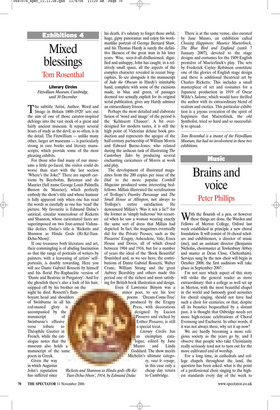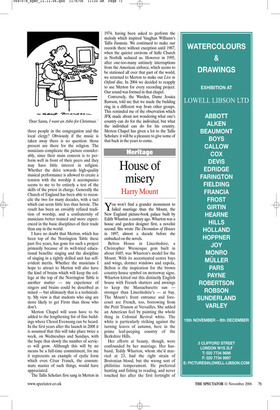Brains and voice
Peter Phillips
With the flourish of a pen, or however these things are done, the Warden and Fellows of Merton College, Oxford last week established in principle a new choral foundation. It will consist of 16 choral scholars and exhibitioners, a director of music (me), and an assistant director (Benjamin Nicholas, choirmaster at Tewkesbury Abbey and master at Dean Close, Cheltenham). Services sung by the new choir will begin in October 2008; the first auditions will take place in September 2007.
I’m not sure which aspect of this story will strike the general reader as more extraordinary: that a college as well set up as Merton, with the most beautiful chapel in the world and famously good acoustics for choral singing, should not have had such a choir for centuries; or that, despite all its beauties bequeathed by a distant past, it is thought that Oxbridge needs yet more high-octane celebrations of Choral Evensong and Eucharist. In other words, if it was not always there, why set it up now?
We are hardly becoming a more religious society as the years go by, and I observe that people who take Christianity really seriously tend not to turn out for the more cultivated end of worship.
For a long time, in cathedrals and college chapels throughout the land, the question has been asked: what is the point of a professional choir singing to the highest standards every day of the week to three people in the congregation and the local clergy? Obviously if the music is taken away there is no question: those present are there for the religion. The musicians complicate the picture considerably, since their main concern is to perform well in front of their peers and they may have little interest in religion. Whether the drive towards high-quality musical performance is allowed to create a tension with the worship it accompanies seems to me to be entirely a test of the skills of the priest in charge. Generally the Church of England has been able to reconcile the two for many decades, with a tact which can seem little less than heroic. The result has been an enviably refined tradition of worship, and a confraternity of musicians better trained and more experienced in the basic disciplines of their trade than any in the world.
I have no doubt that Merton, which has been top of the Norrington Table these past five years, has gone for such a project primarily because of its well-tried educational benefits: singing and the discipline of singing in a tightly drilled unit has selfevident merits. Whether the musicians I hope to attract to Merton will also have the kind of brains which will keep the college at the top of the Norrington Table is another matter — my experience of singers and brains could be described as mixed — but ultimately that is a technicality. My view is that students who sing are more likely to get Firsts than those who don’t.
Merton Chapel will soon have to be added to the lengthening list of fine buildings where Choral Evensong can be heard. In the first years after the launch in 2008 it is assumed that this will take place twice a week, on Wednesdays and Sundays, with the hope that slowly the number of services will grow. Although this will by no means be a full-time commitment, for me it represents an example of cyclic form which even César Franck, the consummate master of such things, would have appreciated.
The Tallis Scholars first sang in Merton in 1974, having been asked to perform the melody which inspired Vaughan Williams’s Tallis Fantasia. We continued to make our records there without exception until 1987, when the quieter environs of Salle Church in Norfolk seduced us. However in 1995, after one-too-many untimely interruptions from the American airforce, which seems to be stationed all over that part of the world, we returned to Merton to make our Live in Oxford disc. In 2004 we decided to reapply to use Merton for every recording project. Our sound was formed in that chapel.
Conversely, the Warden, Dame Jessica Rawson, told me that we made the building ring in a different way from other groups. This reminded me of the observation which JFK made about not wondering what one’s country can do for the individual, but what the individual can do for his country. Merton Chapel has given a lot to the Tallis Scholars: it will be a pleasure to give some of that back in the years to come.



































































































 Previous page
Previous page